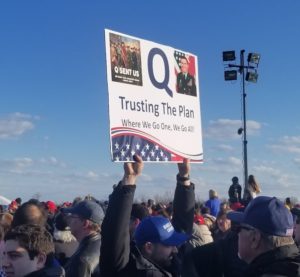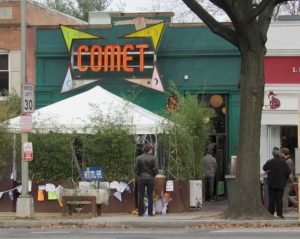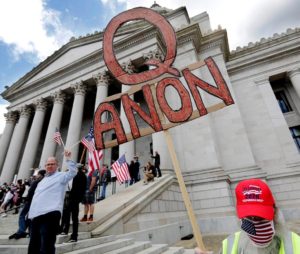“Is QAnon the Most Dangerous Conspiracy Theory of the 21st Century?” a New York Times opinion writer asked.
“QAnon is conspiratorial, dangerous, and growing,” a CNN business analyst wrote.
“QAnon is dangerous lunacy that should have no place in American politics,” Rep. Liz Cheney (R-WY), daughter of former GOP vice president Dick Cheney said.
 Social media companies, including Facebook and Twitter, are cracking down on QAnon-related accounts and user activity with bans and restrictions because of “problems with harassment and misinformation.” As private companies, they have a right to control their content and censor users.
Social media companies, including Facebook and Twitter, are cracking down on QAnon-related accounts and user activity with bans and restrictions because of “problems with harassment and misinformation.” As private companies, they have a right to control their content and censor users.
QAnon, which Wikipedia describes as “a far-right conspiracy theory alleging a secret plot by a supposed ‘deep state’ against President Donald Trump and his supporters [n]o part of [which] has been shown to be based in fact,” and often associated with fantastical allegations of child sex trafficking, hit the internet in 2017 and has blossomed into a movement; and the FBI warned in a 2019 report that it’s “very likely [to] motivate some domestic extremists to commit criminal, sometimes violent activity.”
 It already has. In 2016, a man walked into a Washington D.C. pizza parlor falsely labeled by QAnon supporters as a site of a child sex trafficing ring and opened fire with an AR-15 rifle. He went to prison. QAnon and similar conspiracy theories have inspired or instigated a number of other threatening, near-violent, and violent incidents, some of which are described in the Wikipedia article.
It already has. In 2016, a man walked into a Washington D.C. pizza parlor falsely labeled by QAnon supporters as a site of a child sex trafficing ring and opened fire with an AR-15 rifle. He went to prison. QAnon and similar conspiracy theories have inspired or instigated a number of other threatening, near-violent, and violent incidents, some of which are described in the Wikipedia article.
 QAnon supporters also have staged protests. While these may just seem silly, they are attacks on truth and rationality that tend to undermine trust in government and public institutions, and can affect compliance with health regulations, among other things.
QAnon supporters also have staged protests. While these may just seem silly, they are attacks on truth and rationality that tend to undermine trust in government and public institutions, and can affect compliance with health regulations, among other things.
But the greatest danger of all posed by QAnon is its assault on truth, logic, and our safety from mob rule. As to the latter, the QAnon movement and its supporters are fundamentally a mob, one that could readily become a series of lynch mobs.
The internet has brought unprecedented access to information, and opportunities for exercising free speech, but an uncensored internet (and we don’t want to censor it, if we are to remain a free society) also means anybody can say anything, it doesn’t have to be true, and it even can be (and is) used to inspire dangerous or violent behavior.
Living in a free society, we’ve always placed the responsibility on individuals, not government, to decide what’s true and choose their own beliefs. Obviously, if people embrace falsehoods and conspiracy theories, that’s not good for either those individuals or society at large. Our colleges try to train students to think (see my essay here). Susceptibility to falsehoods and conspiracy theories is often, but not always, associated with people who haven’t developed thinking skills (some people who should know better promote falsehoods for financial gain, political, or other reasons).
The solution is not government restrictions on thinking or speech. That’s the very essence of a totalitarian society. Rather, individuals must take responsibility for what is an individual responsibility. Think, dammit. Of course, people have a right not to think, and believe or utter any nonsense they choose; and we should preserve and defend that right, because if everyone’s not free, no one is. But thinking is what God gave us brains for, and if we don’t use them, we’re wasting one of God’s greatest gifts to humankind. (Not the greatest; that would be the capacity for, and power of, love.)
Return to The-Ave.US Home Page
Photos: (Top left) Protesters at a Michigan rally. (Center) The pizzeria stormed by a gunman who thought Hillary Clinton was running a child sex trafficking ring in the basement; the building doesn’t have a basement. (Bottom left) Protest against masks at Washington’s state capitol. Below: QAnon protesters storm CNN building
https://youtu.be/DTPnxwNPMHU